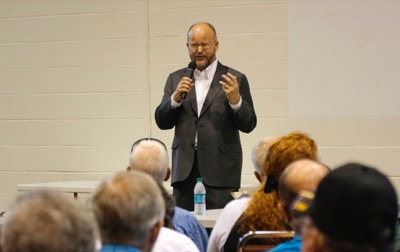Monday, June 11th, 2018
Author talks of campaign against indigenous people
By Sydney Albert

Photo by Sydney Albert/The Daily Standard
Historical author William Hogeland of Brooklyn, New York, speaks to a crowd in Fort Recovery at the Church of Nazarene's Family Center on Sunday.
FORT RECOVERY - The area that would become Ohio played a pivotal role in the formation of the United States, yet many people often underestimate its part, according to historical author William Hogeland.
More than 50 history enthusiasts gathered at the Fort Recovery Church of the Nazarene's Family Center on Sunday to hear Hogeland, who originates from Brooklyn, New York, as part of the Fort Recovery State Museum's Summer Speaker Series. In his writing career, Hogeland has tried to highlight events of historical significance that often go overlooked.
And that includes the events that led to the founding of Fort Recovery.
The battle that pitted Gen. Anthony Wayne against the indigenous peoples in the Ohio Valley was the first war the nation ever fought after its founding, Hogeland said. Yet it has never even been given a proper name.
Hogeland claimed this oft-forgotten conflict helped determine the existence and trajectory of the America that is known today.
It was under Wayne that the United States first formed a standing Army, which had been a controversial subject in the early days of the nation, and continued to be during Wayne's military campaign through the Northwest Territory. Many in the states thought the American way was to fight wars using militias rather than paying for a standing army, as nations like Britain did.
Even after the army was formed with the support of President George Washington, many politicians had busied themselves trying to pull funding for the new military. Wayne knew the Army couldn't afford a loss such as the one suffered by Gen. Arthur St. Clair at the Battle of the Wabash, which would go on to become the greatest victory of indigenous peoples against white settlers in American history.
With a steadfast commitment to caution and security that helped him earn the nickname "Mad" Anthony Wayne, he penetrated Indian-held territory and helped secure confidence in the Army, paving the way for the military as it is known today, Hogeland argued.
Wayne's success in the Ohio Valley also helped set the stage for future American expansion, Hogeland said. Many early politicians, including Washington, viewed westward expansion as the future of the nation. Before the Revolutionary War, the Quebec Act enacted by Britain had prohibited Americans from expanding westward. Later, it was referenced as one of the final tipping points that lead the American colonists to fight for independence.
If Wayne had failed to clear the way for white settlers, and if funding had been pulled from the fledgling military, who knows how long it would have been before the country made another attempt to conquer the west, Hogeland said.
In this way, Hogeland argues the Midwest was a huge factor in the formation of modern America, even before the later agriculture and industrial booms. If indigenous leaders like Little Turtle and Blue Jacket had managed to fend off Wayne, America - and by extension, the world - might have developed very differently.



